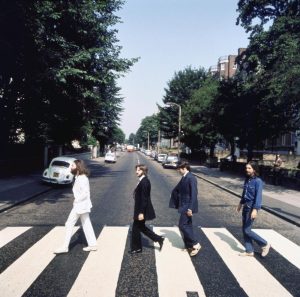By Jeff Slate, The Daily Beast | “We were there four months—or George and I were. We lost thirteen pounds and (barely) looked a day older,” John Lennon told a BBC reporter while promoting the Beatles’ new business venture, Apple Records, of The Fab Four’s 1968 visit to India to study with Maharishi Mahesh Yogi. “I don’t know what level he’s on, but we had a nice holiday in India and came back rested-to-play businessmen.”
“He’s on the level,” Paul McCartney, ever the diplomat, chimed in.
Fifty-two years ago, in the spring of 1968, the Beatles traveled to Rishikesh, India, to study with Maharishi, after meeting the ambassador of Transcendental Meditation in the summer of 1967. It’s an oft-discussed but little understood period in the band’s history, and came at a time when the Beatles were both at the top of the mountain creatively and culturally, but had also just come out of the rockiest period they’d ever experienced since exploding into the world’s collective consciousness earlier that decade.
While Sgt. Pepper’s Lonely Hearts Club Band and the singles “Penny Lane” / “Strawberry Fields Forever” and “All You Need Is Love”—also part of the first global satellite broadcast—had broken sales records around the world and ushered in a massive change to the pop-music landscape, the Beatles’ television film Magical Mystery Tour had been met with derision, and their manager, Brian Epstein, had died of a drug overdose at the shockingly young age of 32.
“I knew that we were in trouble then,” John Lennon said, reflecting on the period to Rolling Stone’s Jann Wenner in 1970. “I didn’t really have any misconceptions about our ability to do anything other than play music. I was scared. I thought, ‘We’ve fuckin’ had it.’”
And so, at the urging of George Harrison, already a disciple of sitar master Ravi Shankar and seeking a spiritual path beyond the doses of LSD he was popping—and Lennon was reportedly taking daily—the Beatles were off to India.
“We had all the material things, fame and all that, but there was still something needed, you see,” Harrison told the Saturday Evening Post at the time. “It can’t be one hundred percent without the inner life, can it?”
“They had everything they could ever want, but they’d realized that wasn’t the answer to anything,” recalls Jenny Boyd, a model at the time, and the sister of Pattie Boyd, George Harrison’s then-wife, who traveled with the entourage as part of their pilgrimage to India. “It was all very exciting because I thought, ‘Oh, gosh, this is what I want. I want to be able to have something that feels meaningful.’ Everyone else was quite excited, too.”
Still, Boyd had her concerns about Maharishi.
> > > > > > > > >
“Maharishi, what have you done, you’ve made a fool of everyone,” Lennon wrote in the original lyrics to “Sexy Sadie,” a song he came up with while waiting for the car that whisked him, his wife Cynthia, George Harrison, and Pattie and Jenny Boyd from the Maharishi’s ashram. It was only after Harrison suggested changing the title that Lennon softened the blow to the now familiar refrain of the song.
> > > > > > > > >
“We went to visit Maharishi in an ashram, and the first thing that George did—after offering him a rose as a greeting for him to bless and then give it back to us at the end—was to say, ‘I’ve come here to apologize on behalf of the Beatles,’” recalls Chopra. “Maharishi asked, ‘Why did you come to apologize?’ George said, ‘Because of what happened in 1968. You know, John said some unfortunate things about you.’ I don’t even know what it was, but it was something salacious, apparently, and it created a bit of a scandal. And Maharishi laughed it off. He said, ‘There’s nothing to apologize for. The Beatles are angels on earth. Because of the Beatles, the world will change. Their music will change the world and it will cause a big shift in collective consciousness. There’s never any need to apologize.’ And George was very emotionally moved, and he slept in the ashram that night.”
Ultimately, the Beatles were never again the four men, united against the world, that they had been before their visit to Rishikesh. From 1968 onward they were on parallel paths, and Paul Saltzman, whose journey led him from meeting the Beatles in India and, ultimately, to making a film about the experience, has some insight into why.
> > > > > > > > >
Read the whole story here along with some great photos:
https://www.yahoo.com/news/transformative-time-beatles-india-080624615.html


